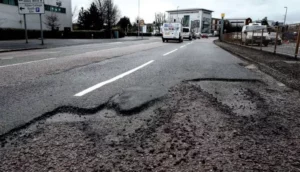A major government review has found ‘clear evidence’ of authorities within the highways sector
that have coped well under the intense and sustained pressures placed on them by a variety of extreme-weather hazards over recent years.
But despite this, the sector must ‘co-design’ better ways to support communities over coming decades, according to one expert, who worked on the response in one community that had suffered badly by extreme weather in recent years.
The report, prepared for the Local Government Technical Advisers Group (LGTAG) and Department of Transport (DfT) Emergency Preparedness, Response, & Recovery: Identifying lessons learned by the UK highway sector from extreme-weather emergencies (2015-2020) said evidence of innovation and learning has been ‘clearly apparent.’
The report added: “Such findings are encouraging. However, persistent challenges to sector resilience are also identified. This includes the observation that whilst extremely competent in dealing with highways issues during incidents, practitioners in the sector do not necessarily have access to the tailored training in emergency management that could further enhance their contribution to multi-agency working. This focus on achieving resilience in the sector by facilitating the development a broad cadre of Suitably Qualified, Experienced and Empowered Personnel (SQEEP) at all tiers of management runs through the report.
“It is also obvious that an encouraging amount of effort is being expended in collaboration. Local highway authority personnel are working to build resilience, both internally in their authorities (e.g., by developing integrated contingencies alongside their authorities’ resilience units) and externally, with other authorities and responder agencies, but also with suppliers and communities.”
The report also highlighted examples of highways authorities warning and informing the public about hazards,
including the increasing use of Social Media in pulling information from and pushing it to the public during incidents, clearly illustrate a broadly held understanding of the importance of effective communication strategies.
Responding to the report, John Lamb, Past President of Local Government Technical Advisers Group said: “When DfT Commissioned this in-depth review of highway sector resilience it started a process that has left no stone unturned in sector challenges we face. Highways are the life line upon which our communities depend. They are the conduit for power, water, comms as well as being central to modern life – walking, cycling or buses and upon which our blue light service rely and our supply chains depends. Calderdale was the UK worst affected Borough back in 2015 with six major bridges lost. Cumbria had 1,234 assets impacted and communities severed a disaster as defined by the United Nations.
“More frequent and more intense weather systems are hitting our communities hard. Future events will be worse than Cumbria (Desmond plus 20% rainfall). In publishing this report, DfT are showing real leadership about how the sector must co-design better ways to support communities over coming decades. The challenge spans administrative boundaries and parliamentary terms of office – it must tackle dated assets of generations long gone and doctrine that must swiftly be rethought in light of Deeming (author of the report).”
Mr Lamb added: “We cannot rely on Military aide and the Chinook – capacity and capability of local teams and how our Highway Heroes are supported by Council Directors and Council Chief Executives has been given context and clarity.
“Publishing this report as COP26 closes is a reminder that the costs of historic inaction will hit communities globally for generations to come. The report supports the UK and maintains a UK lead on Resilience and Response.”
He calls on three core principles of the report to be taken forward:
1. The report must be at the heart of sector rethink of serving our communities
2. We must support our teams to be more consistent and swifter in undertaking Rapid Impact Assessment of assets that are being hit by extreme events to prevent or mitigate failures
3. A continuous learning approach must accept and learn from future asset collapse and impacts to communities.
The full report can be read here: Emergency Preparedness, Response and Recovery: identifying lessons learned by UK highways sector from extreme-weather emergencies (2015-2018) (publishing.service.gov.uk)





















